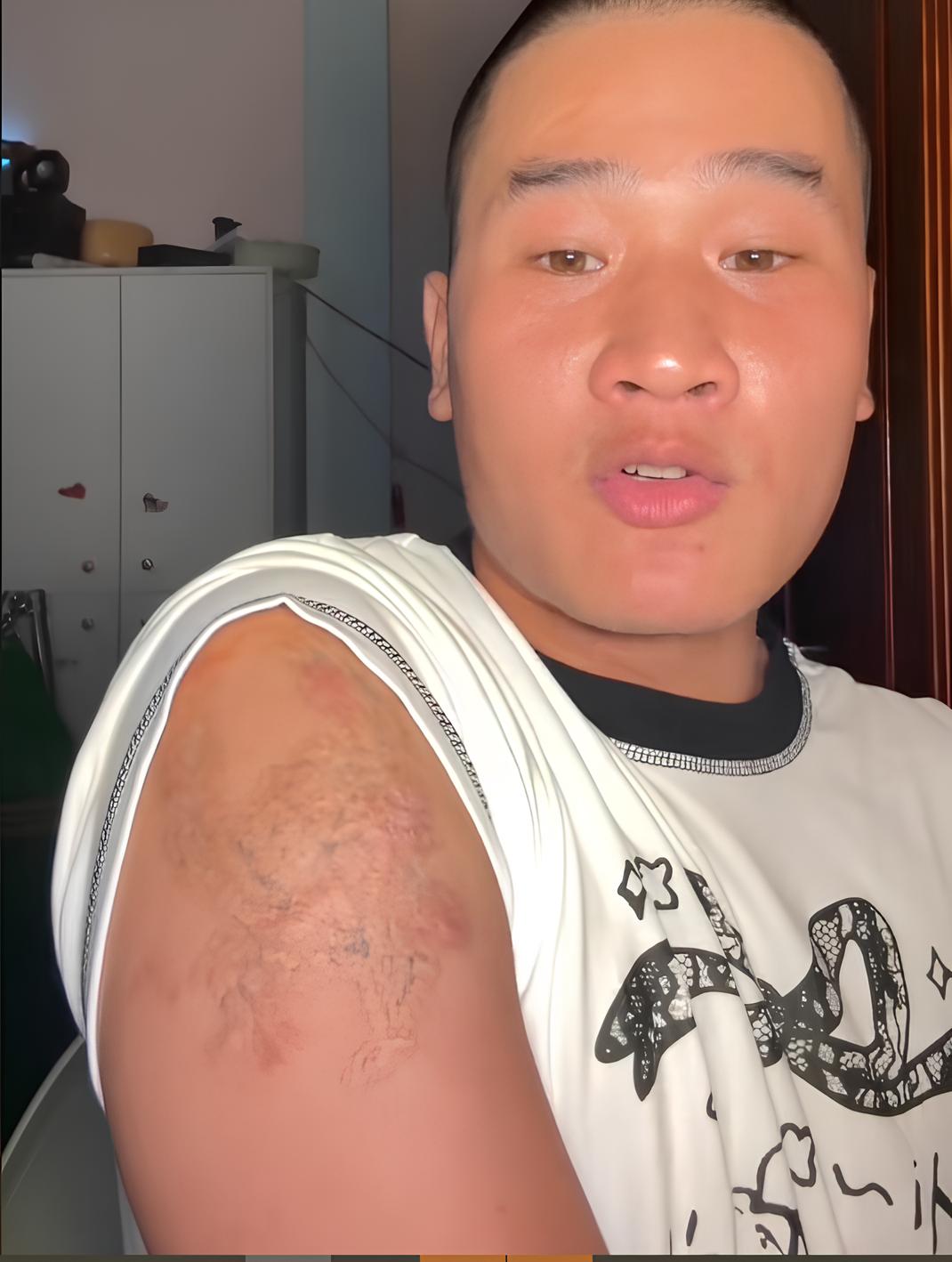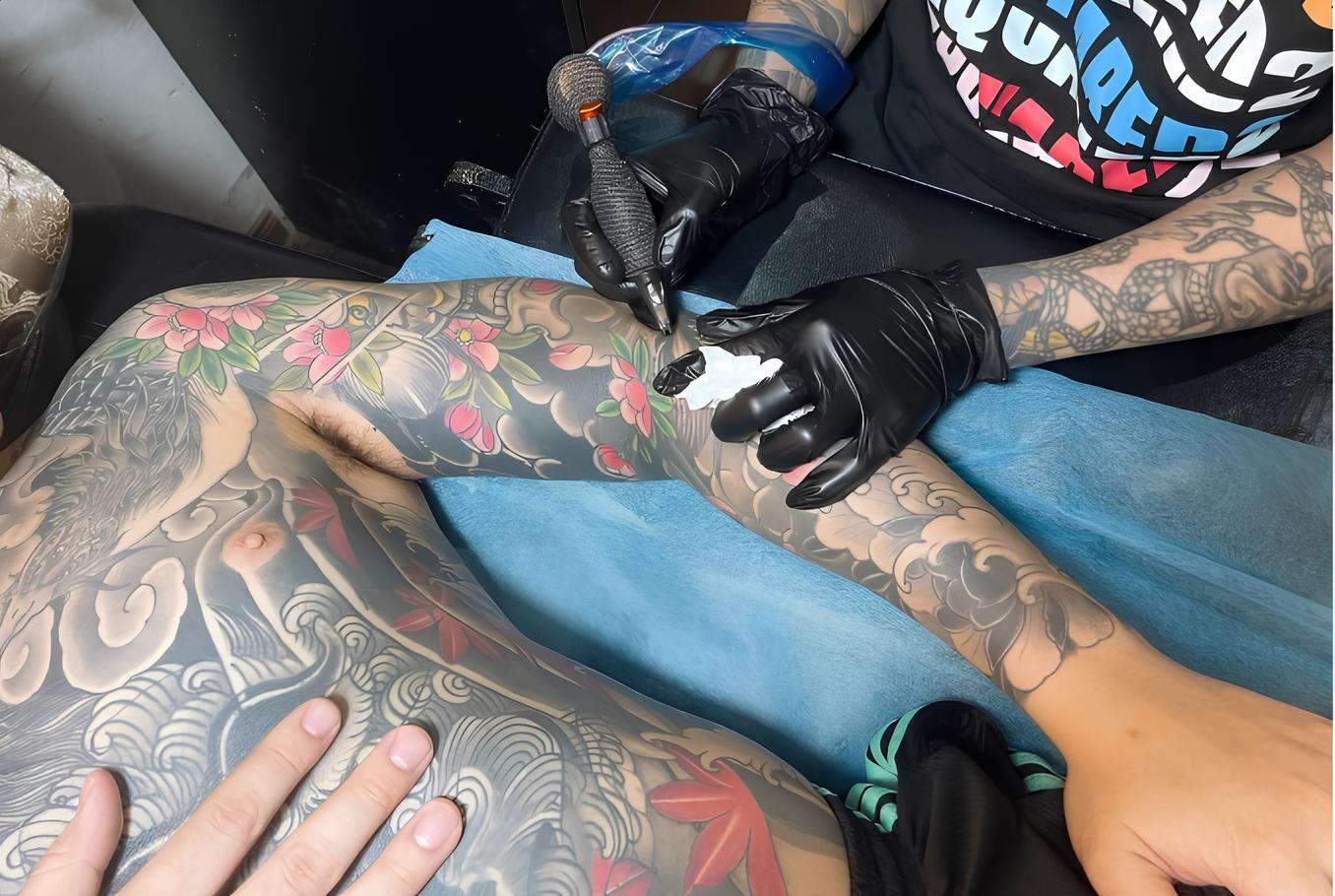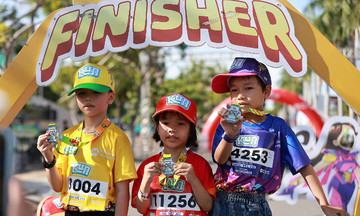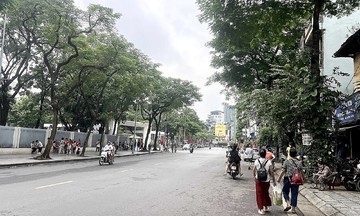"I was the only one in school with a tattoo. I felt so cool," said Ngoc, now 31, from Thach That, Hanoi.
But Ngoc's "cool" feeling lasted only a few days. He soon regretted it as he was constantly gossiped about. Friends stopped hanging out with him because their parents forbade them. "My parents were so upset they couldn't speak when they found out," Ngoc said.
In 12th grade, wanting to follow in his father's footsteps, he applied to the artillery officer academy. His father quietly took him to the hospital for removal, as tattoos are prohibited for military school candidates.
The doctor quoted a removal cost of over 12 million VND. "I was shocked. The tattoo cost 400,000 VND, but removal was over 12 million VND, 30 times more expensive, more than the price of our motorbike," Ngoc recalled. He looked down silently as his father scraped together the money.
The removal procedure lasted over an hour. Ngoc's skin was red, smelled burnt, and the machine sizzled. His keloid-prone skin became swollen and bumpy.
"The scar was extremely bad. I was embarrassed to go anywhere; it was worse than the tattoo," he said.
 |
Can Bao Ngoc's scar after tattoo removal. Photo provided by the subject |
Can Bao Ngoc's scar after tattoo removal. Photo provided by the subject
Many young people have to remove tattoos due to problems in their work and personal lives. Tam Anh General Hospital in TP HCM and Tam Anh General Clinic in District 7 report around 500 tattoo removal visits monthly, mostly people aged 20 to 30, many of whom got their tattoos as minors.
A 2021 Statista (USA) survey found that 12% regret getting a tattoo. Another poll revealed that almost half of 18-35 year olds have tattoos. Of those, 25% regret it.
The tattoo removal industry is projected to reach a global value of 800 million USD by 2027. In Vietnam, dozens of online tattoo removal consultation groups attract thousands of members. Common reasons include career impact, disapproval from partners' families, lifestyle changes, or ex-partners' names.
Ngoc Anh, 27, from Thanh Hoa City, got a red rose tattoo on her arm with her and her boyfriend's initials inside a heart, commemorating her first love in college.
After the breakup, the tattoo became a constant reminder of what she wanted to forget. When she entered a new relationship, her boyfriend advised her to keep it, saying "everyone has a past, the present is what matters." She didn't listen, but the removal scar wouldn't fade.
After marriage, the old ink became a source of jealousy for her husband. "It must have been serious to carve his name into your skin," he would say.
Psychologist Nguyen Thi Le Thuy from the Youth Development Skills Center (Hanoi) believes tattoos shouldn't be used to judge someone's character. They simply reflect their personality and style.
While modern Vietnamese society is more open to tattoos, prejudice remains. In environments demanding conformity, like education, the military, or public-facing roles, tattoos are not welcome. "Tattoos are not bad, but they can lead to unforeseen problems for young people," Thuy said.
A VnExpress survey of nearly 2,000 readers found almost 50% wouldn't want to work with someone with tattoos. This explains why many young people have had to remove tattoos due to career implications.
For celebrities, the stigma is even stronger. Recently, the newly crowned Miss Universe Vietnam faced intense criticism for revealing arm tattoos. Many argued that tattoos are inappropriate for a beauty queen, a symbol of traditional beauty.
Associate Professor Pham Ngoc Trung, a cultural researcher and former Head of the Culture and Development Department at the Academy of Journalism and Communication, suggests that tattoos can be art to some, but rebellion to others. "Society needs more cultural dialogue to avoid extreme personal viewpoints," he said.
He explained that tattoos existed in ancient Vietnamese culture. "Our ancestors had the custom of tattooing to identify clans, their totem animals like birds, turtles, or snakes, or to harmonize with nature, for example, tattooing to ward off crocodiles while swimming or diving," he said.
Today, however, tattoos hold diverse meanings, from art, lifestyle, self-expression, to fashion.
 |
A man in Hanoi getting a tattoo on his arm in early 5/2023. Photo: Quynh Nguyen |
A man in Hanoi getting a tattoo on his arm in early 5/2023. Photo: Quynh Nguyen
My Hanh, in TP HCM, also wanted to express her personality through tattoos. She believed her future wouldn't be affected, working in a foreign company. She loved small, delicate tattoos, covering her arms, shoulders, and chest.
But when her company began collaborating with Vietnamese universities, Hanh was unexpectedly passed over for a representative role she was expected to fill. "You have many tattoos, which could create a negative impression in the educational environment," her boss told her directly.
She argued, claiming her boss was prejudiced. Tensions rose. Hanh resigned, and her resignation was immediately accepted. "I don't regret the tattoos, but to say they don't cause trouble would be a lie," she admitted.
Expert Hong Huong suggests that while self-expression is positive for young people, they should carefully consider the placement, content, and timing of tattoos for adaptability, appropriateness to their circumstances, and long-term career goals.
She advises young people considering tattoos to envision themselves at 35 by asking six questions: Who are my friends and relationships? What is my health like? What are my assets? Where do I want to go? What qualities do I want to have? What kind of family do I want to build?
"By visualizing their future selves, young people will have their own answers about whether or not to get a tattoo," the expert said.
Associate Professor Pham Ngoc Trung suggests that if they are unsure, young people can try temporary tattoos, which last a few weeks to a few months, to experiment with the feeling. "There are ways to express individuality without jeopardizing long-term prospects," he said.
After his tattoo at 16, Can Bao Ngoc never got another one. Not accepted into the military academy as he'd hoped, he volunteered for military service to experience life as a soldier.
Last week, he shared his tattoo story and its consequences on social media, attracting over 4 million views. Despite anticipating controversy, Ngoc stated he wasn't condemning tattoos, but wanted young people to think carefully before deciding.
"If you're not sure, it's best to leave your body as your parents made it," he said.
*Some names have been changed.
Pham Nga












